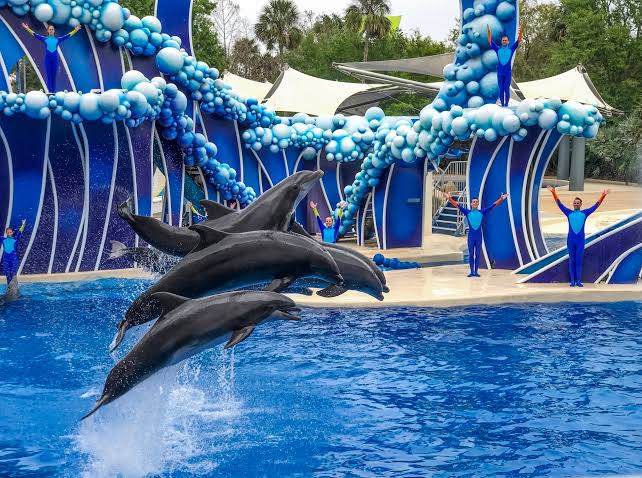SeaWorld Orlando Releases Statement on Park Enhancements, Animal Welfare, and New Attractions
Orlando, FL — In a comprehensive statement released this week, SeaWorld Orlando has addressed public inquiries and outlined a bold vision for the park’s future. The statement, covering multiple aspects of park operations, includes updates on animal welfare, sustainability efforts, and the introduction of new guest experiences.
A Renewed Focus on Animal Care and Conservation
SeaWorld Orlando emphasized its ongoing commitment to animal care and marine conservation, reinforcing its role as a leading marine life rescue and rehabilitation center.
“For over five decades, SeaWorld has stood at the forefront of marine animal rescue,” the statement reads. “With more than 40,000 rescues to date, our mission remains steadfast: to protect and preserve marine life while educating future generations.”
The park detailed its ongoing partnerships with organizations such as the Florida Fish and Wildlife Conservation Commission and NOAA to aid in the rescue and rehabilitation of manatees, sea turtles, and seabirds. SeaWorld’s new Dolphin Health Research Center, scheduled to open in early 2026, will feature expanded facilities for medical care, behavioral research, and guest education.
“Animal welfare is not just a department at SeaWorld—it is a culture embedded into every aspect of our work,” said Dr. Lena Ramos, Director of Veterinary Operations. “The new research center will allow us to expand our efforts and share critical data with conservationists worldwide.”
New Attractions for 2025 and Beyond
In addition to its conservation initiatives, SeaWorld Orlando unveiled plans for new attractions that blend entertainment with education.
The headlining addition is Abyss: Descent into the Deep, a state-of-the-art dark ride and immersive experience simulating a deep-sea exploration mission. With a narrative led by virtual marine scientists, guests will encounter animatronic and digital recreations of bioluminescent sea creatures, deep-sea volcanoes, and ancient shipwrecks.
“Our creative and education teams worked closely to ensure this ride thrills and informs,” said Marcus Linley, SeaWorld Orlando’s VP of Creative Development. “We want guests to walk away excited about what lies beneath the ocean’s surface and inspired to protect it.”
Also announced was a redesigned Shamu Stadium experience, now officially renamed Ocean Echoes Theater. The new show, debuting this summer, will no longer feature orca performances but will instead use augmented reality, live narrators, and cinematic projections to tell the story of orcas in the wild. This shift reflects the park’s commitment to phasing out theatrical animal shows in favor of educational exhibits.
SeaWorld Orlando’s popular Sesame Street Land will also receive a significant expansion, with two new rides and interactive character zones opening in spring 2026.
Sustainability and Environmental Goals
The statement outlined SeaWorld’s multi-year sustainability plan, which includes goals to reduce carbon emissions, eliminate single-use plastics from guest areas, and invest in renewable energy sources. As part of this effort, the park has begun installing solar panel arrays over parking areas and backstage facilities.
“SeaWorld understands that protecting the ocean starts with how we operate,” the statement reads. “Our GreenWave initiative commits us to measurable progress in energy, water, and waste management.”
New initiatives include water-saving filtration systems in aquariums, compostable food packaging at dining locations, and partnerships with local organizations to clean up Florida waterways.
Community Outreach and Education Programs
SeaWorld Orlando also announced new community programs to further engage schools, families, and local organizations. One of the most notable is the “Blue Classroom” program, which will offer free in-park educational workshops for Title I schools across Central Florida.
“Our mission is deeply tied to education,” said Sarah Bentham, Director of Education Programs. “By expanding access to hands-on learning, we hope to spark a lifelong interest in marine biology, conservation, and the sciences.”
In collaboration with the University of Central Florida, SeaWorld will also sponsor marine research fellowships and internships beginning in Fall 2025.
Response to Public Concerns
Addressing ongoing public discourse about marine animal captivity, SeaWorld reiterated its position that animal habitats within the park are built to meet the highest standards of care and are continuously evaluated by third-party accrediting bodies.
“Our animal care team is accredited by the American Humane Association, the Alliance of Marine Mammal Parks and Aquariums, and the Association of Zoos & Aquariums,” the park stated. “We continue to invest in improvements and advocate for transparency.”
SeaWorld officials also noted that no new orcas have been brought into captivity in nearly two decades and that the park’s remaining orcas are under long-term professional care, receiving enrichment, medical support, and individualized attention.
“We understand and respect the evolving views on marine life in human care,” said Dr. Ramos. “Our role now is to care for these animals responsibly while working toward a future where fewer rescues are needed because oceans are healthier.”
Looking Forward
SeaWorld Orlando’s statement concludes with a message of optimism, calling on guests and conservationists alike to work together to protect marine environments.
“In 2025 and beyond, SeaWorld will continue to evolve—innovating our experiences, deepening our scientific contributions, and remaining a trusted place where families can learn, explore, and be inspired,” the statement concluded.
Guests can follow SeaWorld Orlando’s website and social media channels for continued updates on construction progress, educational events, and conservation milestones
